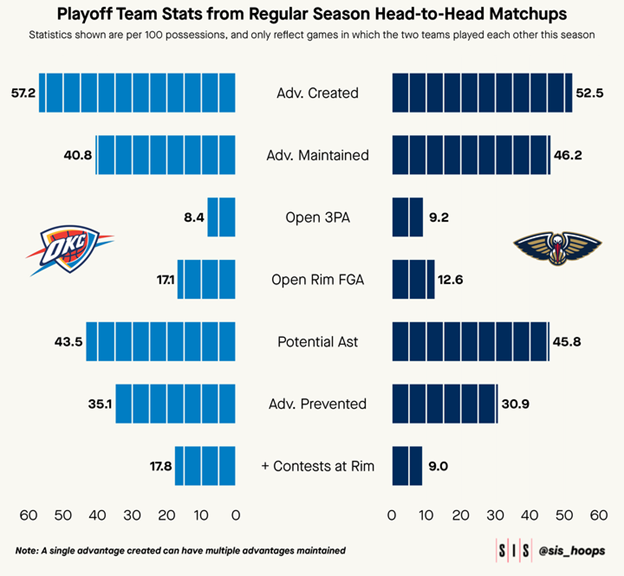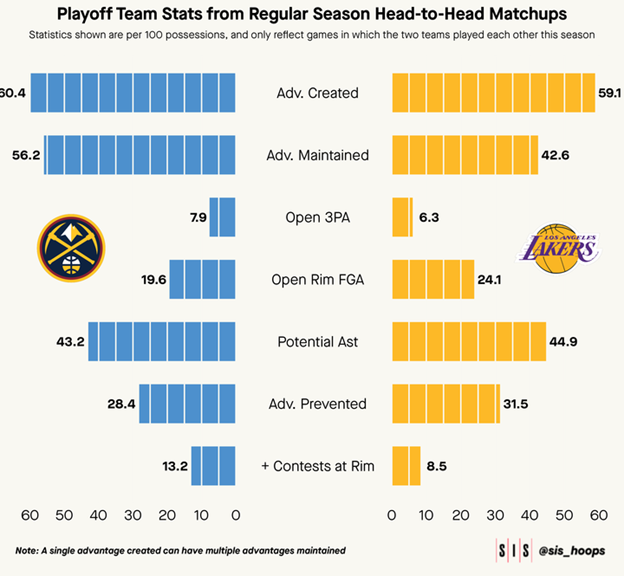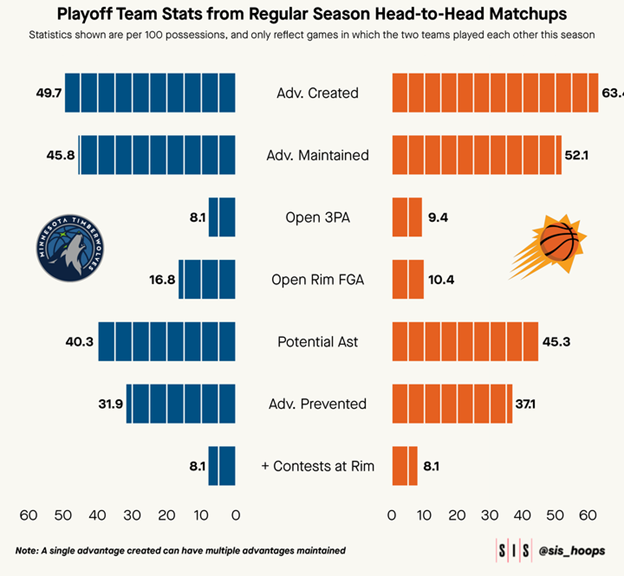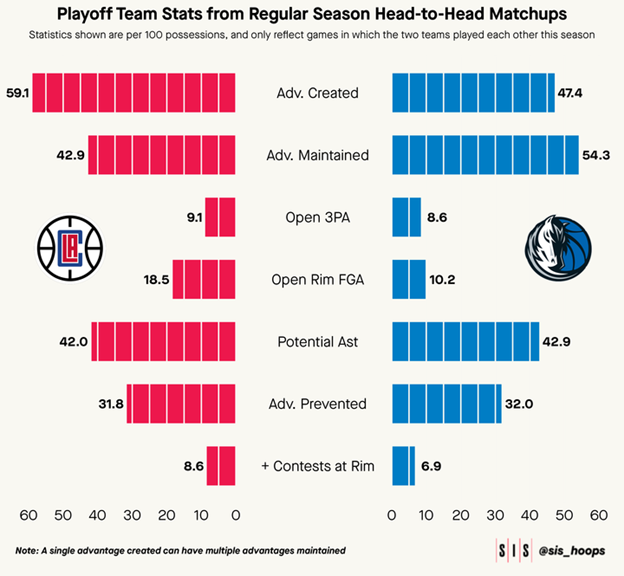By Eli Cohen, Reecca MaWhinney, and Blake Benjamin (graphics by Noah Edwards-Thro)
With the Eastern Conference Playoffs beginning Saturday, we wanted to break down each first-round matchup using our proprietary data. Each tile chart below outlines how the teams fared in their head-to-head matchups this season including all possessions played, All metrics given are Per 100 Possessions and do not include garbage time unless otherwise stated.
For a primer on Advantage Creation and some of the other metrics mentioned in these articles, check out our Twitter, @SIS_Hoops, and reach out if you have any questions.
- Thunder vs. 8. Pelicans
The Thunder may be young, but make no mistake, they didn’t become the youngest No. 1 seed in history in a hyper-competitive Western Conference as a fluke.
Nor are they a one-trick pony when it comes to relying on their top-3 MVP candidate Shai Gilgeous-Alexander. They’re well-rounded and well-coached, ranking in the top-5 in most categories on both offense and defense, and thanks in large part to the two-way leap from Jalen Williams, they’re able to at least tread water when SGA is off the court.
They run a hyper-efficient offense, thanks to their team being constructed around a principle of always maintaining five-out spacing, and they move the ball as well as any team, ranking 6th in assists per 100 possessions (25), 4th in hockey assists (8), and 2nd in maintained advantages (46).
Those numbers combine to show a team that makes quick decisions once Alexander or Williams penetrate the shell of the defense and do not squander opportunities.
Defensively, while the Thunder, and Alexander in particular, like to play passing lanes, they are remarkably disciplined for a team so young. They committed the fewest breakdowns* of any team this season (4.5 per 100 possessions) and were 10th in total negative defensive plays.
*Player makes a defensive miscue through poor communication, understanding of scheme, or decision-making leading to a significant offensive advantage
The two weaknesses they have are offensive rebounding (ranking 27th) and sending teams to the line (ranking 23rd). Matching up against the Pelicans in the first round, they will be dealing with strong, physical big men inside. Keeping Chet Holmgren out of foul trouble and working as a team to fight for rebounds will be key to them keeping their advantage.
The Pelicans will be without Zion Williamson for most, if not all, of this series. Surprisingly, during this season the Pelicans have a better offensive rating (119.1) than without Zion (117.8). Pelicans offensive rating without Zion is good for 5th in the NBA and nearly matches the Thunder’s offensive rating of 120.1.
New Orleans can struggle to create advantages, ranking 19th in the league in advantages created and advantages maintained. With players like Brandon Ingram and CJ McCollum, the Pelicans rely on taking and making tough shots. New Orleans is tied for 4th in the NBA in FG% on self-created shots (49.6%) while OKC is ranked 1st (50.9%). We should see a lot of self-created looks from each team’s stars throughout this series.
The Pelicans defense could be the key to this matchup. New Orleans shot defense in particular is concerning against a Thunder team who can take and make tightly contested shots. The Pelicans rank 26th in block/alter% and 23rd in shots defended. However they are good at not sending shooters to the free throw line, ranking 8th in the NBA (8.9 per 100).
The Pelicans rely on defensive playmaking to offset their lack of quality contests, ranking 2nd in positive defensive plays (15 per 100), 1st in steals (4.9 per 100), and 2nd in deflections (8 per 100). Of course the good comes with the bad, the Pelicans rank 25th in the NBA in defensive miscues (18.9 per 100). The Thunder will look to take advantage of the Pelicans tendency to gamble (22nd) and have consistent breakdowns on defense (24th).
Finally, the Thunder’s poor rebounding may be put to the test early in these playoffs. While the Pelican’s rank 19th in our offensive rebound percentage on the season, that number jumps into the top 10 while Jonas Valanciunas is on the floor. Oklahoma City is our 29th-ranked team in defensive rebound percentage. Valanciunas may function as a big X-factor in the series.
Both of these teams will showcase elite shotmaking with a dash of defensive playmaking in their quest to reach the second round. This series will be a fun one to watch with a young Thunder team looking to prove they are the best in the west and a Pelicans team hoping to extend their playoff run long enough to get their star back.

2. Nuggets vs. 7. Lakers
Can the defending champions repeat? It of course starts with the 2-time MVP who had another incredible season. Nikola Jokic ranked in the top 5 in shooting percentage above expectation, something that he was able to maintain during last year’s playoff run. Combine the scoring with Jokic’s passing ability and the Nuggets will be incredibly difficult to contain. Jamal Murray is no slouch as their No. 2 option. In last year’s championship run, Murray was a top-5 advantage creator with the ball.
On the defensive side, the Nuggets performed better than expected this season. This is the result of a team familiar with each other and the scheme it wants to execute. The majority of the rotation performs better than expected on the defensive side of the ball, led by Aaron Gordon and the bench rotation. Peyton Watson has been a fun watch this season and leads the team in advantages prevented on defense.
The Lakers will have a shot at redemption from last year’s sweep. The Nuggets will need to defend without fouling. Denver ranked 19th in opponent free throw rate, while Los Angeles is a top-5 free throw rate team and is up to 2nd in the league since the All-Star break.
Los Angeles has been playing some of its best basketball since inserting Rui Hachimura into the starting lineup on Feb. 3. Since then the Lakers offensive numbers have popped, including a tie for the 2nd-best offensive rating in the league (this without sacrificing much on defense). Nearly all of the Lakers starters have seen their individual offensive efficiency jump as well.
Finally, LeBron James is difficult to count out even at 39 years old. In his 21st season he is still one of the very best players in the game, ranking in the top 10 in advantages created this year. Not only does he create good looks for himself and his teammates, he also converts on his scoring opportunities at a higher than expected level. He has earned the benefit of doubt in most cases, but the Nuggets are the defending champions for a reason.
The Lakers will have the chance to seek revenge against the Nuggets who swept them out of the playoffs just a season ago. With each team’s core members still intact, it will be exciting to see which team is able to swing some of the key stats in their favor.

3. Timberwolves vs 6. Suns
The Timberwolves arguably have the most to prove of any of the top three seeds in the West. They put together a fantastic regular season, but both of their big men have their own playoff performance questions to answer as they head into a matchup with the ultra-talented but inconsistent Suns.
The Wolves are built on defense first and foremost. This season they were first in allowed points per chance* and defensive rating, and the difference between their defensive rating 109.1 and 2nd-place Magic (111.7) is bigger than the gap between the Magic and the 10th-place Rockets (113.8).
*Opponent points scored per defensive opportunity that leads to a result in the same sequence
The Wolves are most dominant defensively at the rim, ranking 2nd in rim deterrence, 5th in blocks, and 1st in fewest allowed points per chance on shots at the rim or in the paint, though the Suns tend to prefer midrange shots over rim attempts, ranking 29th in field goal attempts at the rim.
Rudy Gobert’s strength is as a drop defender in the pick and roll while the Suns rank 8th in midrange field goal attempts out of ball-screens, with the 5th-best efficiency, relying on their trio of midrange maestros to take advantage of the shots most teams are willing to concede. The Suns’ shot profile is wildly at odds with the Wolves’ defensive tendencies, making this a fascinating stylistic clash.
Karl-Anthony Towns will also be put to the test defensively. With Gobert anchored to Jusuf Nurkic in the paint and Jaden McDaniels on Kevin Durant, Towns will likely be stuck guarding Grayson Allen, who is coming off a career year in which he shot 46% from 3-point range.
Meanwhile, Bradley Beal seems to have settled into his role as a malleable complement to Devin Booker and Durant, and Mike Conley will have his hands full trying to slow him down.
The Suns are hungry for post-season wins and uniquely poised to give the Wolves fits. Meanwhile the Wolves are desperate to prove their regular season success can translate. But which will hold up more: the Wolves’ defense or the Suns’ offense?

4. Clippers vs. 5 Mavericks
It is hard to know how the Clippers will look if Kawhi Leonard misses time in this series.
L.A. does not rank very highly in our team passing statistics which means a lot of the playmaking falls on one player – James Harden. Harden is still one of the elite playmakers in our league and creates over 21 advantages per 100 possessions. He ranks in the top 10 in all of our passing metrics as well.
Defensively, the Clippers have one of the toughest individual matchups in round one. The Clippers have multiple defenders to throw at Luka Doncic.
Both the Mavericks and the Clippers play slowly. They are each a bottom-3 team in total scoring opportunities per game. Yet both teams are incredibly efficient with their scoring opportunities and are still able to generate great looks on offense.
The Mavs are 2nd league-wide in efficiency on field goal attempts out of ball screens, a number greatly bolstered by the mid-season addition of Daniel Gafford, but where they really hang their hat offensively is isolation, utilizing the diverse but equally lethal isolation approaches from Kyrie Irving and Doncic to spearhead their 5th-ranked offensive rating.
They are second in field goal attempts out of isolation opportunities, and 5th in true shooting percentage on those shots. They rank in the bottom third in terms of assists and turnovers, but the creation ability of their two stars is more than enough to keep the offense operating at a high level.
Defensively, the Mavericks are closer to average than elite, but with a scheme that emphasizes staying at home and playing conservatively, they’re able to hold their own enough for their offense to take center stage. They seem content to forego defensive playmaking in order to mitigate defensive breakdowns.
Doncic is no stranger to this Clippers team, averaging 33 points, 9 assists, and 9 rebounds in 13 career playoff games against them, though that has not translated to team success, as the Mavs have lost both previous series. But with his most talented roster to date and Leonard recovering from injury, this could be his best chance yet.




